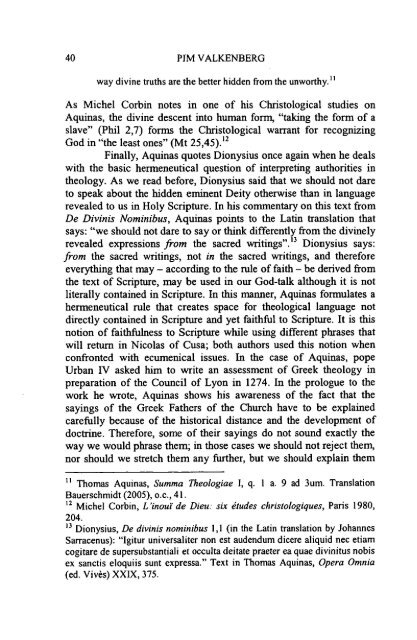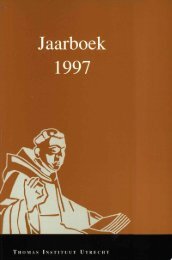Jaarboek Thomas Instituut 2006 - Thomas Instituut te Utrecht
Jaarboek Thomas Instituut 2006 - Thomas Instituut te Utrecht
Jaarboek Thomas Instituut 2006 - Thomas Instituut te Utrecht
Create successful ePaper yourself
Turn your PDF publications into a flip-book with our unique Google optimized e-Paper software.
40 PIM VALKENBERG<br />
way divine truths are the bet<strong>te</strong>r hidden from the unworthy. II<br />
As Michel Corbin no<strong>te</strong>s in one of his Christological studies on<br />
Aquinas, the divine descent into human form, "taking the form of a<br />
slave" (Phil 2,7) forms the Christological warrant for recognizing<br />
God in "the least ones" (Mt 25,45).12<br />
Finally, Aquinas quo<strong>te</strong>s Dionysius once again when he deals<br />
with the basic hermeneutical question of in<strong>te</strong>rpreting authorities in<br />
theology. As we read before, Dionysius said that we should not dare<br />
to speak about the hidden eminent Deity otherwise than in language<br />
revealed to us in Holy Scripture. In his commentary on this <strong>te</strong>xt from<br />
De Divinis Nominibus, Aquinas points to the Latin translation that<br />
says: "we should not dare to say or think differently from the divinely<br />
revealed expressions from the sacred writings"." Dionysius says:<br />
from the sacred writings, not in the sacred writings, and therefore<br />
everything that may - according to the rule of faith - be derived from<br />
the <strong>te</strong>xt of Scripture, may be used in our God-talk although it is not<br />
li<strong>te</strong>rally contained in Scripture. In this manner, Aquinas formula<strong>te</strong>s a<br />
hermeneutical rule that crea<strong>te</strong>s space for theological language not<br />
directly contained in Scripture and yet faithful to Scripture. It is this<br />
notion of faithfulness to Scripture while using different phrases that<br />
will return in Nicolas of Cusa; both authors used this notion when<br />
confron<strong>te</strong>d with ecumenical issues. In the case of Aquinas, pope<br />
Urban IV asked him to wri<strong>te</strong> an assessment of Greek theology in<br />
preparation of the Council of Lyon in 1274. In the prologue to the<br />
work he wro<strong>te</strong>, Aquinas shows his awareness of the fact that the<br />
sayings of the Greek Fathers of the Church have to be explained<br />
carefully because of the historical distance and the development of<br />
doctrine. Therefore, some of their sayings do not sound exactly the<br />
way we would phrase them; in those cases we should not reject them,<br />
nor should we stretch them any further, but we should explain them<br />
II <strong>Thomas</strong> Aquinas, Summa Theologiae I, q. 1 a. 9 ad 3um. Translation<br />
Bauerschmidt (2005), o.c., 41.<br />
12Michel Corbin, L 'inouï de Dieu: six études christologiques, Paris 1980,<br />
204.<br />
13 Dionysius, De divinis nominibus 1, I (in the Latin translation by Johannes<br />
Sarracenus): "Igitur universali<strong>te</strong>r non est audendum dicere aliquid nee etiam<br />
cogitare de supersubstantiali et occulta deita<strong>te</strong> prae<strong>te</strong>r ea quae divinitus nobis<br />
ex sanctis eloquiis sunt expressa." Text in <strong>Thomas</strong> Aquinas, Opera Omnia<br />
(ed. Vivès) XXIX, 375.








